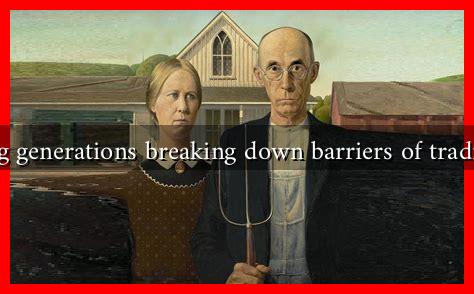-
Table of Contents
Are Young Generations Breaking Down Barriers of Traditionalism?
In recent years, the world has witnessed a significant shift in societal norms and values, largely driven by younger generations. Millennials and Generation Z are increasingly challenging traditional beliefs and practices, paving the way for a more inclusive and progressive society. This article explores how these young generations are breaking down barriers of traditionalism, examining their impact on various aspects of life, including gender roles, work culture, and social justice.
The Rise of Individualism and Self-Expression
One of the most notable characteristics of younger generations is their emphasis on individualism and self-expression. Unlike previous generations, who often adhered to societal expectations, young people today prioritize authenticity and personal fulfillment. This shift is evident in several areas:
- Fashion and Lifestyle: Young people are increasingly embracing diverse styles and identities, rejecting the notion of a singular “norm.” This is reflected in the rise of gender-neutral fashion and the acceptance of various body types.
- Social Media Influence: Platforms like Instagram and TikTok have empowered young individuals to showcase their unique identities, leading to a broader acceptance of different lifestyles and beliefs.
- Art and Culture: Young artists are breaking traditional boundaries by exploring themes of identity, race, and sexuality, often challenging the status quo in their work.
Redefining Gender Roles
Gender roles have long been a cornerstone of traditionalism, dictating how individuals should behave based on their gender. However, younger generations are actively dismantling these outdated norms:
- Gender Fluidity: Many young people identify as non-binary or gender-fluid, challenging the binary understanding of gender. This has led to increased visibility and acceptance of diverse gender identities.
- Shared Responsibilities: In relationships, younger couples are more likely to share household responsibilities and parenting duties, moving away from traditional gender roles.
- Advocacy for Equality: Movements like #MeToo and Time’s Up have gained traction among younger generations, highlighting the need for gender equality and accountability in various sectors.
Work Culture Transformation
The workplace is another area where young generations are making significant strides in breaking down traditional barriers. The conventional 9-to-5 work model is increasingly being challenged:
- Remote Work: The COVID-19 pandemic accelerated the shift towards remote work, a trend that younger employees have embraced. They prioritize work-life balance and flexibility over traditional office settings.
- Value-Driven Employment: Young workers are more likely to seek employment with companies that align with their values, such as sustainability and social responsibility. This has prompted many organizations to reevaluate their practices.
- Gig Economy: The rise of the gig economy has provided young people with alternative career paths, allowing them to pursue multiple interests and create their own schedules.
Social Justice and Activism
Younger generations are at the forefront of social justice movements, advocating for change on issues such as climate change, racial equality, and LGBTQ+ rights. Their activism is characterized by:
- Digital Activism: Social media has become a powerful tool for mobilizing support and raising awareness about social issues. Campaigns like Black Lives Matter have gained global traction thanks to the efforts of young activists.
- Intersectionality: Young activists are increasingly recognizing the interconnectedness of various social issues, advocating for a more holistic approach to activism that considers race, gender, and class.
- Global Perspective: Young people today are more globally minded, often collaborating with international movements to address issues that transcend borders.
Conclusion
The younger generations are undeniably breaking down barriers of traditionalism, reshaping societal norms and values in profound ways. Through their emphasis on individualism, redefinition of gender roles, transformation of work culture, and commitment to social justice, they are creating a more inclusive and progressive world. As these trends continue to evolve, it is essential for society to recognize and support the contributions of young people in fostering a future that values diversity and equality.
For further reading on the impact of young generations on traditionalism, you can explore resources from organizations like Pew Research Center and United Nations Youth.

